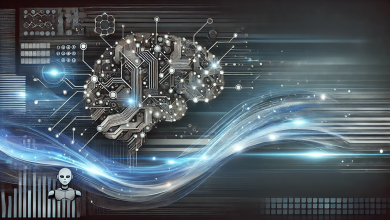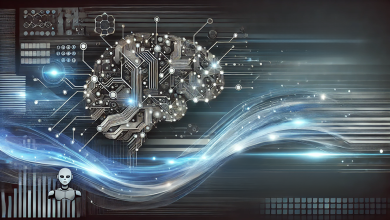Unlocking AI: Transformative Innovations for the Future
In the present age, artificial intelligence (AI) stands as one of the most revolutionary technologies shaping our lives. From enhancing business operations to redefining creativity, AI serves as a catalyst for significant changes across various industries. But what exactly is artificial intelligence, and how does it impact our future? This exploration seeks to delve into the world of AI, shedding light on its transformative innovations, practical applications, and the promising horizon it offers.
Understanding Artificial Intelligence
Artificial intelligence refers to the simulation of human intelligence in machines programmed to think and learn like humans. This encompasses a variety of technologies, including machine learning, deep learning, natural language processing, and robotics, among others. The ability of systems to analyze vast datasets, understand human language, and recognize patterns enables them to execute tasks traditionally performed by humans, often more efficiently and accurately.
The Evolution of AI: A Brief Overview
The journey of artificial intelligence can be traced back to the 1950s when pioneers like Alan Turing began contemplating the potential of machines to mimic human thought. Fast forward to 2025, and AI has evolved dramatically, fueled by advancements in data processing, the proliferation of the internet, and innovative algorithms. Today, AI systems are capable of performing complex tasks ranging from automated customer service to medical diagnosis.
Transformative Innovations in AI
AI in Healthcare
The integration of AI in healthcare has been transformative, enabling healthcare professionals to diagnose diseases more accurately and swiftly. Technologies such as predictive analytics and AI-driven imaging systems have significantly improved patient outcomes. For example, AI algorithms can analyze X-rays and MRIs, assisting radiologists in identifying conditions like tumors earlier than ever before.
- Tools to Explore:
- IBM Watson Health – A powerful AI system that helps clinicians and researchers analyze medical data.
AI in Business
Artificial intelligence is reshaping the business landscape by optimizing operations, enhancing customer engagement, and driving sales. AI-powered tools such as chatbots handle customer inquiries round the clock, providing immediate support and improving customer satisfaction.
- Tools to Explore:
- Zendesk – A customer service software that utilizes AI to enhance customer experiences and streamline support processes.
AI in Education
Education is another sector where AI is making a significant impact. Personalized learning platforms use AI algorithms to assess students’ strengths and weaknesses, tailoring educational content to fit individual learning paces and styles. This promotes more effective learning experiences.
- Tools to Explore:
- Knewton – An adaptive learning platform that provides personalized learning experiences powered by AI.
AI in Creativity and Content Creation
AI is also revolutionizing the creative sphere, from art and music to writing and design. Tools like OpenAI’s ChatGPT can generate content based on user prompts, contributing significantly to creative writing and marketing efforts.
Current Trends in AI (2025)
As we navigate through 2025, several trends are emerging in the artificial intelligence space:
-
AI Ethics and Responsible AI: With the growing impact of AI on society, discussions surrounding ethics and responsible use are gaining momentum. Companies are being urged to incorporate ethical considerations into their AI strategies.
-
AI and Automation: The rise of automated systems in industries is streamlining processes and minimizing labor costs, but it also raises concerns about job displacement.
-
AI in Cybersecurity: AI is becoming crucial in protecting systems from cyber threats. Advanced algorithms can detect anomalies and respond to potential threats in real-time.
- AI for Sustainability: Organizations are leveraging AI to improve energy efficiency, analyze climate data, and develop sustainable practices.
Practical Applications of AI
Enhancing Decision-Making with AI
Businesses can harness AI to analyze complex datasets, allowing for more informed decision-making. By retrieving insights from large volumes of data, companies can identify market trends, customer preferences, and operational bottlenecks.
Personal Virtual Assistants
AI-powered virtual assistants like Siri, Google Assistant, and Alexa are becoming integral parts of daily life, managing tasks, answering queries, and controlling smart home devices. These tools simplify daily routines and increase productivity.
AI in Smart Cities
With urbanization on the rise, AI is paving the way for smart city initiatives. From traffic management systems that reduce congestion to waste management solutions that optimize resource usage, AI enhances urban living.
Overcoming Challenges with AI
Despite the myriad of benefits, the rise of artificial intelligence comes with challenges. Issues like data privacy, security, and the ethical implications of AI usage are critical areas that require attention. As we advance, it’s essential to strike a balance between innovation and the safeguards necessary for responsible use.
Frequently Asked Questions (FAQs)
What is artificial intelligence?
Artificial intelligence refers to the ability of machines to perform tasks that typically require human intelligence, such as learning, reasoning, problem-solving, and understanding natural language.
How does AI impact job markets?
While AI automates certain tasks, it also creates new job opportunities, particularly in fields related to AI development, maintenance, and ethics. The key is for the workforce to adapt and acquire new skills to stay relevant.
What are the ethical concerns of AI?
Ethical concerns surrounding AI include issues of bias in algorithms, data privacy, transparency, and the potential for job displacement. Addressing these concerns is crucial for the responsible deployment of AI technologies.
How can I get started with AI?
To start exploring artificial intelligence, consider online courses such as those offered by Coursera or edX. These platforms provide accessible learning resources about AI and its applications.
Conclusion: Embracing the AI Revolution
Artificial intelligence is not just a futuristic concept; it’s an integral part of our present that drives progress and innovation across all sectors. Understanding the nuances of AI and how it affects our daily lives can empower individuals and communities to adapt and thrive in this rapidly evolving landscape. Embrace the journey of learning about AI, experiment with available tools, and contribute positively to this transformative technological revolution.
The future is bright, with artificial intelligence leading the charge toward a more efficient, intelligent, and sustainable world. Now is the ideal time to unlock the potential of AI and become part of a movement that holds the keys to a better tomorrow.

